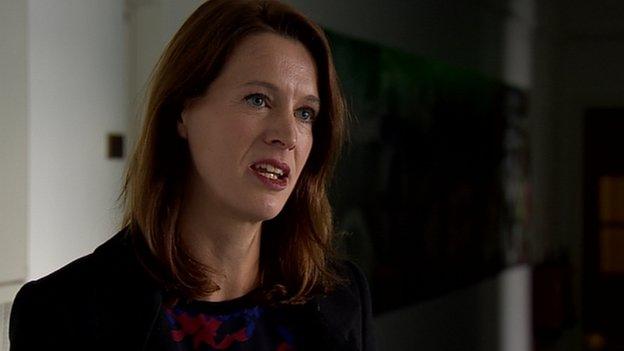Stillbirth rate 'poor' says Scotland's leading maternity doctor
- Published

Dr Catherine Calderwood said more could be done to avoid stillbirth
More must be done to tackle Scotland's poor record on stillbirths, according to the Scottish government's adviser on maternity and women's health.
Dr Catherine Calderwood told BBC Scotland: "Other countries are doing very much better than us."
She said: "At the moment one in 200 babies are stillborn in Scotland. Our rate ranks Scotland 31st out of 33 high income countries in the world."
Three hundred babies are stillborn every year in Scotland.
That is 10 times as many as those who die through cot death.
A stillborn child is defined as a baby born dead after 24 weeks gestation.
Dr Calderwood said Scotland is about to begin a programme to try to reduce the rate.
She said: "We need to make sure women are as healthy as possible before starting a pregnancy.
"We also know that we can improve things when we're looking after them.
"We know that small babies are more at risk and so there is various monitoring we can put in place so that we can pick those babies up and hopefully deliver them in time"
Gavin speaks of the "harrowing experience of being told his first child was stillborn
Gavin Moir and his wife Kirsty lost their first child when Kirsty was 38-and-a-half weeks pregnant.
Kirsty mentioned at a routine appointment that she had not felt the baby move much in the last day.
An ultrasound test revealed there was no longer a heartbeat.
"The baby's room was all ready," said Mr Moir.
"The bags were all packed. To be told that there's nothing there anymore was absolutely devastating for us all. To this day I don't know how we managed to cope."
The Take That star and X-Factor judge Gary Barlow and his wife lost a baby daughter as a result of a stillbirth in August last year.
Dr Calderwood said that there had been a general assumption that nothing much could be done to reduce the number of stillborn children, but that has now changed.
She said: "We have always perhaps believed that some bad things will happen when women are pregnant and we don't want to worry women because most babies will be fine.
"But in fact evidence from other countries shows us that, far from not being able to do something about it, we know that we actually can."
Ann McMurray, Scottish network co-ordinator for the stillbirth charity SANDS, has been working with the Scottish government to increase awareness amongst pregnant women.
In particular, it is interested in following the example of Norway which reduced its stillbirth rate by a third by encouraging women to get a check-up if they noticed their baby was not moving.
Ms McMurray said: "We've been telling people they should get reduced foetal movements checked out.
"Also it's just about making people aware that stillbirth does happen because it's not really spoken about at antenatal clinics.
"It's not that we're scaremongering, because people are told that other things can go wrong."
Gavin and Kirsty Moir have had another son but say they do not think they'll ever get over the trauma of their stillborn first child, whom they named Fraser.
"We still look back and think there could have been more done," said Mr Moir.
"Kirsty had to go to hospital to have tests on the levels of her waters, which had dropped quite considerably.
"It's only with hindsight that we're wondering if there was a problem which should have been monitored more closely."